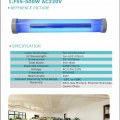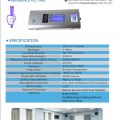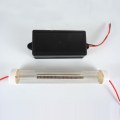- QuantaDose UVC Light Test Cards
- Compare Far-UVC Light Manufactures
- Far UVC Light Fixtures
- First UVC 5w Far-UVC Light 222nm ABS Luminaire
First UVC 5w Far-UVC Light 222nm ABS Luminaire
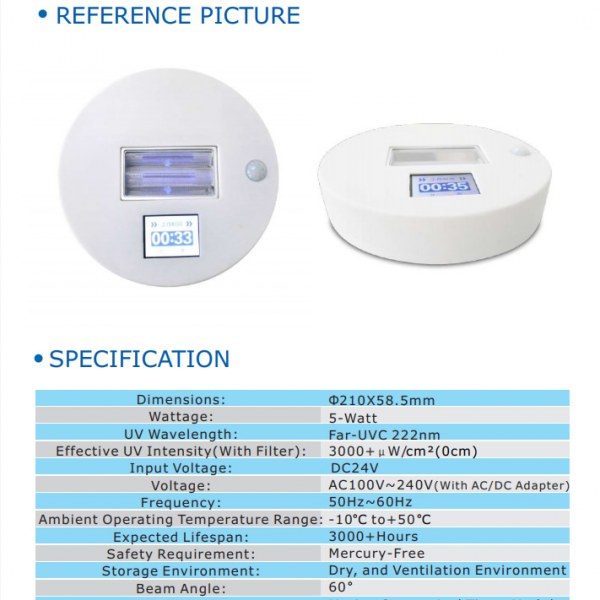

Each 5-Watt Filtered 222nm Far-UVC Lamp is hand-assembled and manufactured in an official ISO9001 Excimer Far-UV Light Factory (quality management systems) delivered by the Agency for International Standardization. To provide the highest-quality Far-UV light products globally, a battery of testing that includes but is not limited to: Microbiological Effectiveness Test, IEC62471 (photobiological safety inspection), BACL ( 222m, wavelength test), and CE, FCC, RoHS Certifications.
- ● LCD Control Board with Remote Control
- ● Motion Sensor (Infrared)
- ● Timer Module For Looping
- ● 5-Watt Safety Filter Technology (Narrowband 222nm Emission)
- ● ZERO Mercury – Environment Friendly
- ● 5-Watt Peak wavelength 222nm
- ● Minimal Ozone Emission
- ● Wide Operating Temperature
- ● 5-Watts Instantaneous On/Off
When you need a 5-Watt Filtered 222nm, Far-UVC Lamp, make sure your Far UVC choice is always QuantaDose for the best Far-UVC lighting to meets your AP-UVGI needs. Our experts are standing by to assist you!
The below spreadsheet tool can help you figure out the time necessary to be effective UVGI and when the maximum levels of safe 222nm exposure have been reached under current international standards. USA 22 mJ/cm2 EU 30 mJ/cm2
Far-uvc-light-222nm-irradiance-time-distance-power-calculation-tool
When mounting an overhead 5-watt Far-UVC ceiling light with a ceiling height of 10 feet, there’s a 75% drop in light power from 1 Foot to 2 Feet, but only a 5% drop in light from 4 feet to 10 feet with only 1% of the light power available at floor level.
For those without an intense knowledge of advanced mathematics (or even very basic mathematics for that matter), something such as the inverse-square law can seem incredibly daunting.
There are equations with numbers and variables, references to physics, and many more things which quite frankly seem very boring. For that reason, we’re going to try to cover this in a very practical way, rather than a technical one, and offer tools and charts that will make it even easier for everyone. It can not be underscored enough how important it is to familiarize yourself with this basic mathematic principle to use the most cutting-edge sanitization method ever devised in human history – Far-UVC lighting.
The law itself, in AP-UVGI applications, using this 5-watt FAR-UVC light, applies to all lighting in general. It applies to any sort of electromagnetic radiation really. Its most relevant application here is germicidal irradiation using light wavelengths of between 207nm-230nm. This very narrow 23nm band of UV light was discovered as a small UV exposure window much safer for humans yet deadly to pathogens responsible for the current pandemic!
In a nutshell, it teaches how to use a 5-watt Far-UV light as a weapon in the War on Flu! The inverse-square law teaches us how 5-Watts of Far-UVC light works over distance and why the distance between your Far-UVC light source and your target area is so important when the amounts of Far-UV light reaching areas are paramount to the safety of people and the effectiveness of UVGI (Ultraviolet germicidal irradiation), or if adding Active Personal into the UV zone than, AP-UVGI, however just think of it as invisible light to keep things simple.
Let’s say we have a 5-watt Far UVC light source that is on full power and our bio-agent target is 1 foot away from it. If our target moves double the distance away from the light (2 feet), how much of the light’s power will reach it? The natural reaction is to think “half power” – but unfortunately that’s now how light works, all light, including germicidal Far-UVC light all follow the inverse-square law of distance.
According to the law, the power of the light will be inversely proportional to the square of the distance. So if we take a distance of 2 and square it, we get 4, the inverse of which would be 1/4 or rather, a quarter of the original light power – not half.
Moving our target 3 feet from the 5-watt Far-UVC light source (3 * 3 = 9, so 1/9) the power of our Far-UVC light on the target now becomes 1/9th of what it originally was, and this is where time becomes a very important factor for effective germicidal irradiation and for the safety of active personnel in the Far-UV light disinfection zone over extended periods of time.
The below chart shows how the drops in light power work from one Far-UVC light mounted at a ceiling height of 300cm to the floor using a 5-watt 222nm excimer KrCl lamp properly bandpass filtered for a human-safe AP-UVGI application.
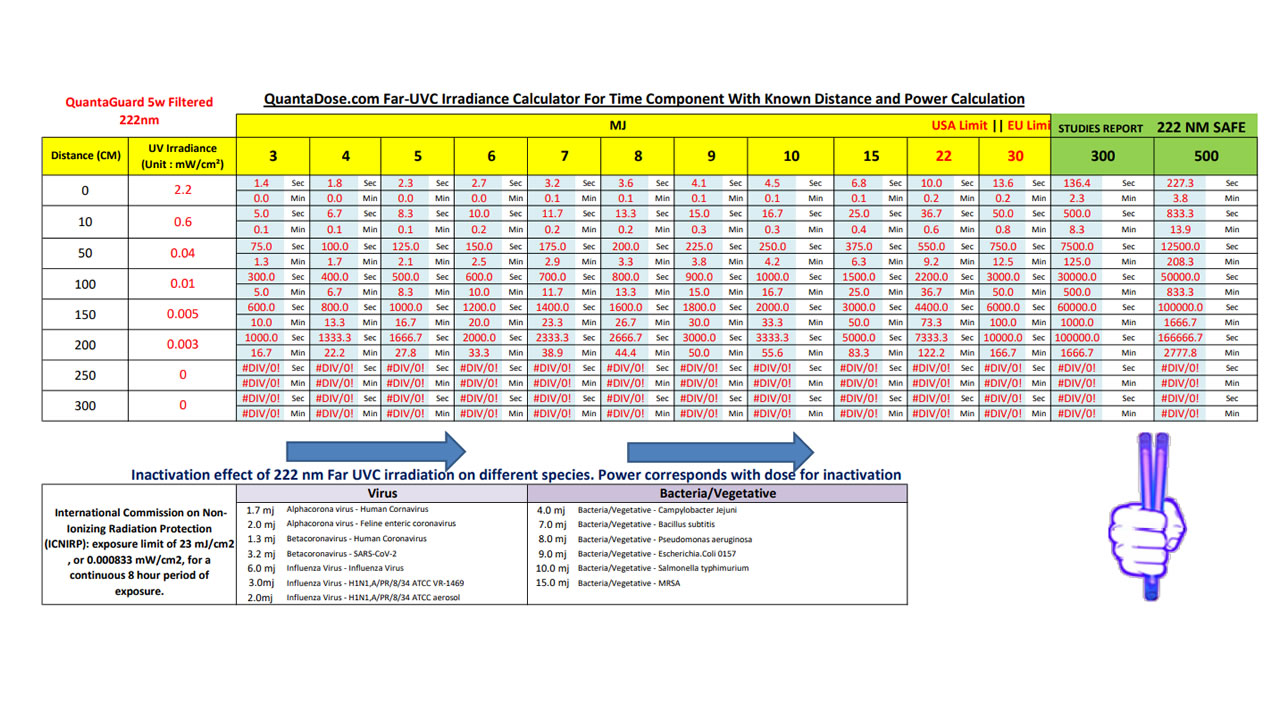
Far-UV Light Specs
Main Specifications
| Lamp Technology Lamp Technology | Excimer lamp (or excilamp) |
| UV Spectrum UV Spectrum | Far-UVC |
| Peak wavelength(nm) Peak wavelength(nm) | 222 nm |
| Total Watts Total Watts | 5w |
| Lamp Gas Mixture Lamp Gas Mixture | KrCl |
| Expected Lifespan Expected Lifespan | > 4000 Hours |
| Dimensions Dimensions | Φ210*58.5mm |
| Mercury Free Lamp Mercury Free Lamp | Yes |
| Beam Angle Beam Angle | 60° |
| Ambient Operating Temp Range Ambient Operating Temp Range | -10°C to+50 °C |
| Input Voltage Input Voltage | 24V |
| Input Current Input Current | DC |
| Certification Certification | CE, FCC, RoHS, FDA |
| Electrical Connectors Included Electrical Connectors Included | |
| End Caps End Caps | Polymer |
| Instant-On Lamp, No Warm-Up Time Instant-On Lamp, No Warm-Up Time | |
| Warranty Warranty | 12 Month |
Time To Reach 6 mJ/cm2 Germicidal Dose
| UVGI Dosage Time @ 0cm UVGI Dosage Time @ 0cm | 2.7 Sec (0.0 min) |
| UVGI Dosage Time @ 10cm UVGI Dosage Time @ 10cm | 10.0 Sec (0.2 min) |
| UVGI Dosage Time @ 50cm UVGI Dosage Time @ 50cm | 150.0 Sec (2.5 min) |
| UVGI Dosage Time @ 100cm UVGI Dosage Time @ 100cm | 600.0 Sec (10.0 min) |
| UVGI Dosage Time @ 150cm UVGI Dosage Time @ 150cm | 1200.0 Sec (20.0 min) |
| UVGI Dosage Time @ 200cm UVGI Dosage Time @ 200cm | 2000.0 Sec (33.3 min) |
Time To Reach 22 mJ/cm2 (Under ICNIRP Limit)
| Time Limit Distance 0cm Time Limit Distance 0cm | 10.0 Sec (0.2 min) |
| Time Limit Distance 10cm Time Limit Distance 10cm | 36.7 Sec (0.6 min) |
| Time Limit Distance 50cm Time Limit Distance 50cm | 550.0 Sec (9.2 min) |
| Time Limit Distance 100cm Time Limit Distance 100cm | 2200.0 Sec (36.7 min) |
| Time Limit Distance 150cm Time Limit Distance 150cm | 4400.0 Sec (73.3 min) |
| Time Limit Distance 200cm Time Limit Distance 200cm | 7333.3 Sec (122.2 min) |
Time To Reach Purportedly Safe Levels 500 mJ/cm2 (Peer reviewed)
| Purported Time Limit Distance 0cm Purported Safe Time (Filtered Only ) | 227.3 Sec (3.8min) |
| Purported Time Limit Distance 10cm Purported Time Limit Distance 10cm | 833.3 Sec (13.9 min) |
| Purported Time Limit Distance 50cm Purported Time Limit Distance 50cm | 12500.0 Sec (208.3 min) |
| Purported Time Limit Distance 100cm Purported Time Limit Distance 100cm | 50000.0 Sec (833.3 min) |
| Purported Time Limit Distance 150cm Purported Time Limit Distance 150cm | 100000.0 Sec (1666.7 min) |
| Purported Time Limit Distance 200cm Purported Time Limit Distance 200cm | 166666.7 Sec (2777.8 min) |

